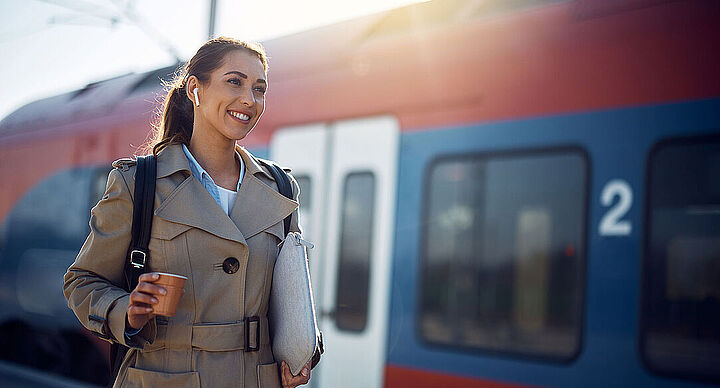Travel activities generally cause greenhouse gas emissions. Choosing a means of transportation plays a central role and may contribute to reducing emissions. An analysis of research and business trips at the TH Wildau has shown that university members have been traveling in a very climate-conscious manner for some time. To support the transformation to a sustainable university, the university management has adopted guidelines for research or business trips.
The guidelines consist of recommendations for planning trips using climate-friendly means of transportation. They rely on personal responsibility and the insight of those planning their travel. They deliberately avoid prohibitions. The (non-)consideration of the recommendations is not a criterion for the approval procedure for a research or business trip.
Online participation versus travel: If it is possible to participate in an event online without significantly limiting the scientific or operational quality of the exchange, virtual participation can be more efficient in terms of time and money than a business trip. It is therefore recommended to hold initial meetings with partners in person and to clarify subsequent arrangements virtually. In the long term, refresher meetings in person continue to make sense in order to strengthen relationships.
Duration of the research/business trip: Occasions should be bundled together wherever possible. It may therefore be more beneficial to plan longer stays at the destination if they are relevant to the business and can be arranged sensibly.
Trips to destinations that can be reached by train in six hours: If a destination can be reached by train in six hours travel time between the relevant train stations of the nearest cities according to the timetable, the university recommends that employees choose the train rather than the plane as their means of transportation. Any accommodation and catering costs incurred as a result will be reimbursed.
Trips to destinations that cannot be reached by train in six hours: Whenever possible, direct flights should be chosen and - if necessary - combined with train travel to reach the destination. The take-off and landing of airplanes generally cause higher greenhouse gas emissions than the length of the flight. In addition, selecting an airline based on the efficiency of the aircraft type and the load factor of the flights using the index of the non-governmental organization atmosfair can help you plan more climate-friendly business trips.
Capacity utilization is the important factor here. The high utilization of a means of transport reduces the value of the CO2 emissions of any individual traveler. This also applies to journeys in a fully occupied car with a combustion engine. The absolute CO2 emissions of the means of transport naturally remain the same.
The TH Wildau regularly communicates measures and cooperation to reduce greenhouse gas emissions in the sustainability report and thus fulfills the legal requirements of the Federal Climate Protection Act (KSG) and the Brandenburg Climate Plan, which pursue the goal of achieving greenhouse gas neutrality by 2045.


